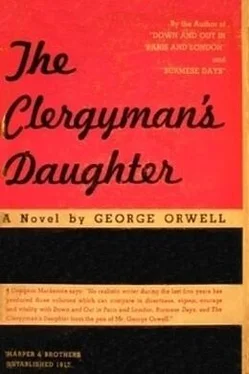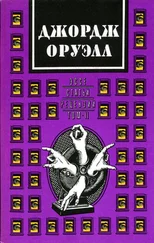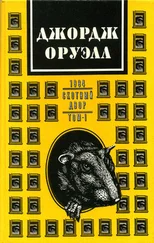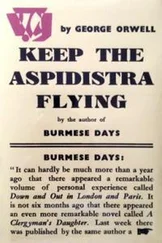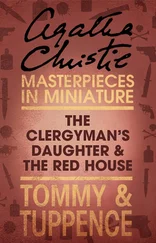She was rather tired. She had had a busy week of it, what with visiting all the women on her list in turn and trying to get the parish affairs into some kind of order again. Everything was in a fearful mess after her absence. The church was dirty beyond all belief—in fact, Dorothy had had to spend the best part of a day cleaning up with scrubbing–brushes, broom and dustpan, and the beds of 'mouse dirts' that she had found behind the organ made her wince when she thought of them. (The reason why the mice came there was because Georgie Frew, the organ–blower, WOULD bring penny packets of biscuits into church and eat them during the sermon.) All the Church associations had been neglected, with the result that the Band of Hope and the Companionship of Marriage had now given up the ghost, Sunday School attendance had dropped by half, and there was internecine warfare going on in the Mothers' Union because of some tactless remark that Miss Foote had made. The belfry was in a worse state than ever. The parish magazine had not been delivered regularly and the money for it had not been collected. None of the accounts of the Church Funds had been properly kept up, and there was nineteen shillings unaccounted for in all, and even the parish registers were in a muddle—and so on and so on, ad infinitum. The Rector had let everything slide.
Dorothy had been up to her eyes in work from the moment of reaching home. Indeed, things had slipped back into their old routine with astonishing swiftness. It was as though it had been only yesterday that she had gone away. Now that the scandal had blown over, her return to Knype Hill had aroused very little curiosity. Some of the women on her visiting list, particularly Mrs Pither, were genuinely glad to see her back, and Victor Stone, perhaps, seemed just a little ashamed of having temporarily believed Mrs Semprill's libel; but he soon forgot it in recounting to Dorothy his latest triumph in the Church Times. Various of the coffee–ladies, of course, had stopped Dorothy in the street with 'My dear, how VERY nice to see you back again! You HAVE been away a long time! And you know, dear, we all thought it such a SHAME when that horrible woman was going round telling those stories about you. But I do hope you'll understand, dear, that whatever anyone else may have thought, I never believed a word of them', etc., etc., etc. But nobody had asked her the uncomfortable questions that she had been fearing. 'I've been teaching in a school near London' had satisfied everyone; they had not even asked her the name of the school. Never, she saw, would she have to confess that she had slept in Trafalgar Square and been arrested for begging. The fact is that people who live in small country towns have only a very dim conception of anything that happens more than ten miles from their own front door. The world outside is a terra incognita, inhabited, no doubt, by dragons and anthropophagi, but not particularly interesting.
Even Dorothy's father had greeted her as though she had only been away for the week–end. He was in his study when she arrived, musingly smoking his pipe in front of the grandfather clock, whose glass, smashed by the charwoman's broom–handle four months ago, was still unmended. As Dorothy came into the room he took his pipe out of his mouth and put it away in his pocket with an absent–minded, old–mannish movement. He looked a great deal older, Dorothy thought.
'So here you are at last,' he said. 'Did you have a good journey?'
Dorothy put her arms round his neck and touched his silver–pale cheek with her lips. As she disengaged herself he patted her shoulder with a just perceptible trace more affection than usual.
'What made you take it into your head to run away like that?' he said.
'I told you, Father—I lost my memory.'
'Hm,' said the Rector; and Dorothy saw that he did not believe her, never would believe her, and that on many and many a future occasion, when he was in a less agreeable mood than at present, that escapade would be brought up against her. 'Well,' he added, 'when you've taken your bag upstairs, just bring your typewriter down here, would you? I want you to type out my sermon.'
Not much that was of interest had happened in the town. Ye Olde Tea Shoppe was enlarging its premises, to the further disfigurement of the High Street. Mrs Pither's rheumatism was better (thanks to the angelica tea, no doubt), but Mr Pither had 'been under the doctor' and they were afraid he had stone in the bladder. Mr Blifil–Gordon was now in Parliament, a docile deadhead on the back benches of the Conservative Party. Old Mr Tombs had died just after Christmas, and Miss Foote had taken over seven of his cats and made heroic efforts to find homes for the others. Eva Twiss, the niece of Mr Twiss the ironmonger, had had an illegitimate baby, which had died. Proggett had dug the kitchen garden and sowed a few seeds, and the broad beans and the first peas were just showing. The shop–debts had begun to mount up again after the creditors' meeting, and there was six pounds owing to Cargill. Victor Stone had had a controversy with Professor Coulton in the Church Times, about the Holy Inquisition, and utterly routed him. Ellen's eczema had been very bad all the winter. Walph Blifil– Gordon had had two poems accepted by the London Mercury.
Dorothy went into the conservatory. She had got a big job on hand— costumes for a pageant that the schoolchildren were going to have on St George's Day, in aid of the organ fund. Not a penny had been paid towards the organ during the past eight months, and it was perhaps as well that the Rector always threw the organ–people's bills away unopened, for their tone was growing more and more sulphurous. Dorothy had racked her brains for a way of raising some money, and finally decided on a historical pageant, beginning with Julius Caesar and ending with the Duke of Wellington. They might raise two pounds by a pageant, she thought—with luck and a fine day, they might even raise three pounds!
She looked round the conservatory. She had hardly been in here since coming home, and evidently nothing had been touched during her absence. Her things were lying just as she had left them; but the dust was thick on everything. Her sewing–machine was on the table amid the old familiar litter of scraps of cloth, sheets of brown paper, cotton–reels and pots of paint, and though the needle had rusted, the thread was still in it. And, yes! there were the jackboots that she had been making the night she went away. She picked one of them up and looked at it. Something stirred in her heart. Yes, say what you like, they WERE good jackboots! What a pity they had never been used! However, they would come in useful for the pageant. For Charles II, perhaps—or, no, better not have Charles II; have Oliver Cromwell instead; because if you had Oliver Cromwell you wouldn't have to make him a wig.
Dorothy lighted the oilstove, found her scissors and two sheets of brown paper, and sat down. There was a mountain of clothes to be made. Better start off with Julius Caesar's breastplate, she thought. It was always that wretched armour that made all the trouble! What did a Roman soldier's armour look like? Dorothy made an effort, and called to mind the statue of some idealized curly–bearded emperor in the Roman Room at the British Museum. You might make a sort of rough breastplate out of glue and brown paper, and glue narrow strips of paper across it to represent the plates of the armour, and then silver them over. No helmet to make, thank goodness! Julius Caesar always wore a laurel wreath—ashamed of his baldness, no doubt, like Mr Warburton. But what about greaves? Did they wear greaves in Julius Caesar's time? And boots? Was a caligum a boot or a sandal?
After a few moments she stopped with the shears resting on her knee. A thought which had been haunting her like some inexorcizable ghost at every unoccupied moment during the past week had returned once more to distract her. It was the thought of what Mr Warburton had said to her in the train—of what her life was going to be like hereafter, unmarried and without money.
Читать дальше
